Executive Summary
New York State’s Enough is Enough law requires colleges and universities in the state to conduct biannual campus climate surveys to measure the prevalence of sexual assault on campus, assess students’ attitudes and awareness about sexual misconduct and how to report it on campus, and help schools identify ways to address the problem.
New York Film Academy’s biennial Sexual Misconduct Prevention Campus Climate Survey, hereinafter referred to as the “survey,” was conducted between November 11, 2022 and November 17, 2022, through the Google Forms platform. The web-based survey could be accessed on smartphones, tablets, or desktops/laptops. Prior to the 2022 survey, the survey was last conducted during the 2020 academic year; specifically from December 1, 2020 through January 22, 2021.
On November 2, 2022, an email was sent to all enrolled students (1,291) in the AFA, BA, BFA, MA, MFA, and one and two year conservatory programs across the New York, Los Angeles, and South Beach campuses informing them of the survey. Although the current legal requirement to administer the survey only applies to the New York campus, NYFA continues to feel the importance of understanding the prevalence of on campus sexual assaults, students’ attitudes and awareness about sexual misconduct, and students’ awareness of their reporting options and resources at each campus.
On November 15, 2022, a reminder to participate in the survey was emailed to all enrolled students (1,291) in the AFA, BA, BFA, MA, MFA, and one and two year conservatory programs across the New York, Los Angeles, and South Beach campuses.
Responses were not received after November 16, 2022 and the response rate for this survey was 6.2%.
In accordance with best practices, incentives were offered in an effort to increase the number of responses received.
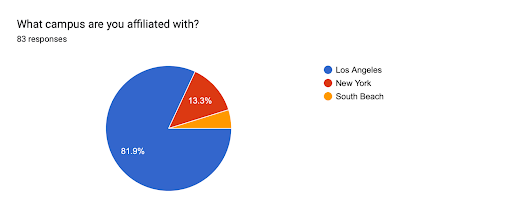
Out of the 83 students who elected to take this survey, 81.9.% of them are students at the Los Angeles Campus. 13.3% are students at the New York Campus, and 4.8% are students at the South Beach Campus. Although the percentage for the Los Angeles campus is much larger than the other campuses (New York and South Beach), the Los Angeles campus is the largest of the three with 841 enrolled students (at the time of the survey). At the time of the survey, the New York campus had 393 enrolled students and the South Beach campus had 57.
The survey included questions to capture information in 11 topic areas required by New York State’s Enough is Enough statute. Those areas include questions about students’ knowledge of, attitudes about, and experiences with campus sexual violence and sexual harassment, and how they respond if they or somebody they know is affected by those behaviors. Within the survey, these 11 topics were organized and explored through the following four sections: General Perception of Safety/ Sexual Misconduct on Campus, Affirmative Consent and Bystander Intervention, Reporting and Awareness of NYFA Policy & Process, and Incidents. A fifth section was created to obtain the characteristics of the students participating in the survey. The information collected from this section is highlighted above.
Every question in the survey, excluding the question about campus affiliation, was optional, allowing each participant to pick and choose the questions to which they felt comfortable responding. The decision to require all participants to indicate which campus they were affiliated with was based on the fact that each campus, New York, Los Angeles, and South Beach, functions as individual campuses, each with its own identity and campus culture. It was important for personnel from each campus to internally assess students’ knowledge, attitudes, perceptions, and experiences on a per-campus basis.
Below, you will find summaries of the four sections: General Perception of Safety/ Sexual Misconduct on Campus, Affirmative Consent and Bystander Intervention, Reporting and Awareness of NYFA Policy & Process, and Incidents. The summaries do not reflect responses received on a per-campus basis and rather highlight specific data points based on the totality (83) of the responses received.
GENERAL PERCEPTION OF SAFETY/ SEXUAL MISCONDUCT ON CAMPUS
This section asked questions to gather information about our campus community’s understanding of NYFA policies, reporting options, resources, and behaviors that demonstrate sexual misconduct. The information obtained from this section was designed to help us understand the perception of our campus community regarding sexual misconduct as a problem on our campuses, of NYFA’s response to incidents of sexual misconduct, and about the overall culture at NYFA.
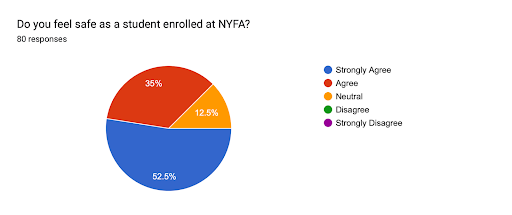
Out of the 83 students who elected to take the survey, 80 responded to this question. Out of those 80 responses, 87.5% agree or strongly agree that they feel safe as a student enrolled at the New York Film Academy.
AFFIRMATIVE CONSENT AND BYSTANDER INTERVENTION
This section asked questions to gather information about our campus community’s understanding of affirmative consent and to help NYFA assess the likelihood for student bystanders to intervene in situations.
NYFA defines affirmative consent as a knowing, voluntary, and mutual decision among all participants to engage in sexual activity.
- Consent can be given by words or actions, as long as those words or actions create clear permission regarding willingness to engage in sexual activity.
- Silence or lack of resistance, in and of itself, does not demonstrate consent.
- Consent to any sexual act or prior consensual sexual activity between or with any individual does not necessarily constitute consent to any other sexual act.
- Consent is active, not passive, and cannot be assumed. If there is confusion or ambiguity,
- individuals need to stop sexual activity and communicate about each person’s willingness to continue.
- Consent is required regardless of whether the person initiating the act is under the influence of drugs and/or alcohol.
- Consent may be initially given but withdrawn at any time. When consent is withdrawn or can no longer be given, sexual activity must stop.
- Consent cannot be given when a person is incapacitated, which occurs when an individual lacks the ability to knowingly choose to participate in sexual activity.
- Incapacitation may be caused by the lack of consciousness or being asleep, being involuntarily restrained, or if an individual otherwise cannot consent.
- Depending on the degree of intoxication, someone who is under the influence of alcohol, drugs, or other intoxicants may be incapacitated and therefore unable to consent.
- Consent cannot be given when it is the result of any coercion, intimidation, force, or threat of harm.
- The definition of affirmative consent does not vary based on a participant’s sex, sexual orientation, gender identity, gender expression, or relationship status
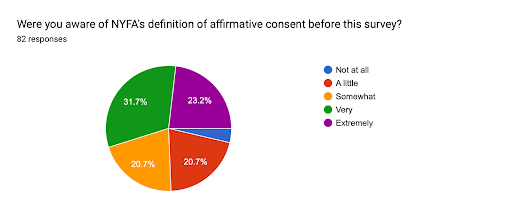
Out of the 83 students who elected to take the survey, 82 responded to the question. Out of those 82 responses, 54.9% indicated that they were extremely aware of or were very aware of NYFA’s definition of affirmative consent. 20.7% were somewhat aware and only 3.7% were not aware of NYFA’s definition of affirmative consent.
REPORTING AND AWARENESS OF NYFA POLICY AND PROCESS
This section asked questions to gather information about our campus community’s awareness of the reporting process and the resources available during and associated with the process.
NYFA’s amnesty policy states that the health and safety of every student at NYFA is of utmost importance. NYFA recognizes that students who have been drinking and/or using drugs (whether such use is voluntary or involuntary) at the time that violence, including but not limited to domestic violence, dating violence, stalking, or sexual assault occurs may be hesitant to report such incidents due to fear of potential consequences for their own conduct. NYFA strongly encourages students to report domestic violence, dating violence, stalking, or sexual assault to the Title IX Coordinator. A bystander acting in good faith or a reporting individual acting in good faith that discloses any incident of domestic violence, dating violence, stalking, or sexual assault to NYFA or law enforcement will not be subject to NYFA’s Student Code of Conduct for violations of alcohol and/or drug use policies occurring at or near the time of the domestic violence, dating violence, stalking, or sexual assault.
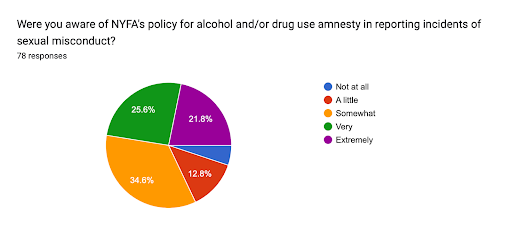
Out of the 83 students who elected to take the survey, 78 responded to this question. Out of those 78, 47.4% of the students indicated that they were extremely or were very aware of NYFA’s amnesty policy. 52.5% indicated they were somewhat aware, were a little aware, or were not at all aware of NYFA’s amnesty policy.
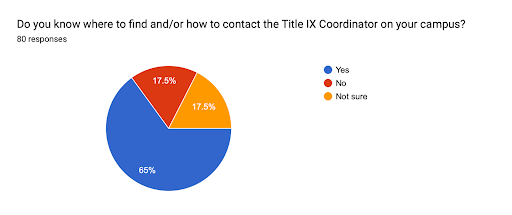
Out of the 83 students who elected to take the survey, 80 responded to this question. Out of those 80, 65% indicated that they know how to find and/or contact the Title IX Coordinator at their campus.
INCIDENTS
The sections asked questions about personal experiences with sexual misconduct and they responded when they were affected by those behaviors.
Specific information regarding these questions is not posted to maintain confidentiality. However, reports by NYFA students of sexual harassment, stalking, dating violence, domestic violence, and sexual assault at NYFA or NYFA-affiliated events or programs are significantly lower than rates reported by residential colleges, or colleges with large athletic programs and Greek life.
NEW YORK FILM ACADEMY PLEDGE
The New York Film Academy will use the results of this survey to further improve our ability to ensure a safe, healthy, and nondiscriminatory learning environment for all NYFA students on each individual campus and at an institutional level.
1. At each New York Film Academy campus, the only confidential resource available to students on-campus is the NYFA Counseling Services. This information is given to new students through NYFA’s online Sexual Respect Training and reinforced in a live presentation during New Student Orientation Week.
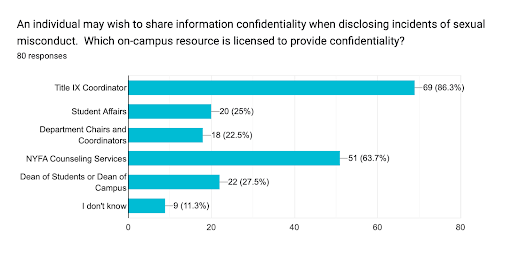
Based on the responses received, we understand that more time must be dedicated to educating our student body on the differences between confidentiality and privacy and the resources available. NYFA pledges to accomplish this by providing additional programming and initiatives, such as class drops-ins, flyers, and e-blasts, throughout the semesters(s) focusing on confidential and private resources.
2. NYFA pledges to increase awareness surrounding all on- and off-campus resources by expanding on and highlighting this information throughout new student orientation. When future survey participants are asked how comfortable they would be getting in touch with certain groups and organizations, NYFA hopes to receive responses from students that reflect an increased comfort level in regards to getting in touch with NYFA resources.
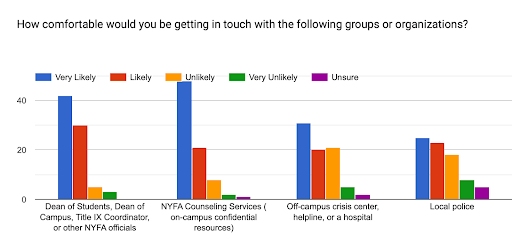
3. NYFA pledges to improve student awareness on the topics of affirmative consent and NYFA’s amnesty policy. Students first receive this information during new student orientation, but the responses to these survey questions only indicate that an average of approximately 50% of students knows or understands NYFA’s expectations about affirmative consent (54.9%) and/or amnesty (47.4%). NYFA would like this percentage to increase. NYFA will continue to utilize the Sexual Respect Training, mandatory training for all first-semester students, and Title IX Orientation to help accomplish this goal. NYFA pledges to continually update all NYFA training materials on a semester basis, to maximize retention and understanding of the content presented, and to reflect future updates to relevant local, state, and federal laws.
4. NYFA also pledges to sign a Memorandum or Understanding (MOU) with an advocacy center based out of the Burbank/Los Angeles area that focuses on sexual misconduct prevention. The New York Campus currently has MOUs in place with New York City Alliance Against Sexual Assault and with Mount Sinai Beth Israel. The South Beach Campus has an MOU in place with the Roxcy Bolton Rape Treatment Center.
5. NYFA pledges to work towards cultivating a higher response rate for the 2024 Campus Climate Survey. NYFA plans to accomplish this goal through further research of promotional best practices, such as incentives, social media promotion and general awareness.
6. Lastly, NYFA pledges to utilize external partnerships (including existing and future MOUs) to accomplish all of the above pledges.
Over the next two years, NYFA will work to complete these action items. When an action item is completed, updates will be made to this page and or email blasted to the NYFA campus community.
